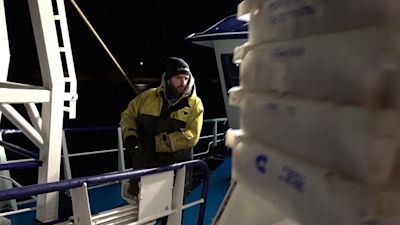Scottish fishermen are taking their catch to Denmark rather than selling it at home in bid to battle Brexit bureaucracy

By ITV News Correspondent Juliet Bremner
The crew of Scottish trawler Daystar are becoming accustomed to the two-day crossing to Hanstholm, a port on the North coast of Denmark.
According to the skipper David Watson it's worth the extra time and fuel because they can sell their prawns for a much better price than they can currently get back home in Scotland.
The day we filmed them landing their catch they made an additional £7,000 and agreed this likely to become a regular trip.
The decision to sell their shellfish in Denmark is one of the consequences of the Brexit deal on fishing communities in North East Scotland.
David comes from Fraserburgh and would normally sell his catch at Scotland's biggest fish market in Peterhead but prices there plunged earlier this year.
On one day in January, boxes of fish normally selling for between £40 and £60 sold for just £8, a drop of 80%.
Although there are various theories about the causes of the price slump in Peterhead, everyone accepts that the deal done with Europe has caused serious problems for the Scottish fishing industry.
The fish caught by Scottish boats accounts for nearly two thirds of all catches around the UK making it a vital part of the Scottish economy.
One of the benefits of the single market was the smooth delivery of fresh seafood to markets in France and Spain where buyers pay more for the Scottish produce.
Before January 1st this year, fish and shellfish brought landed in Scotland would be sold, driven south, shipped across the straits of Dover and delivered to France within 24 to 36 hours.
Now they are faced with Brexit bureaucracy. This involves completing a complex set of veterinary and customs forms, which can delaying time sensitive consignments by up to 10 hours and in the most extreme cases are resulting in entire lorry loads having to be written off.
The delays are not being seen at Dover because the bottleneck is happening at clearing hubs in central Scotland.
Any missing information, even if it is as minor as the wrong code for a species of fish, means a consignment cannot be signed off by customs officials.
One wrongly completed form can result in fish from numerous different suppliers, sharing one truck under a system known as groupage, all missing their dispatch deadline.
Although the bigger wholesalers can afford to employ full time staff to complete the paperwork this is often not the case for smaller producers.
The groups representing them are calling on the UK, EU and Scottish governments to urgently find a solution.
Suggestions include a grace period of six months to allow everyone to familiarise themselves with the requirements or relocating one of the clearing hubs to North East Scotland so it's closer to the biggest fish market and many exporters.
Scottish seafood is still prized for its quality but there are warnings that European buyers won't stand for the delays in the long term.
If boats continue to take their catches to Denmark rather than Scotland it means that processors in Peterhead are cut out.
With so many jobs in this part of Scotland linked to the fish industry, finding a way of reclaiming that business must be a priority.